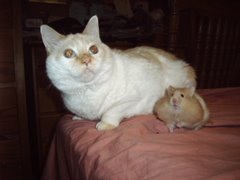I found these two articles. The first one is from the NY times..the second from a doctor at The Rockefeller Universtiy. It's what I've believed for a long time now..
They are long articles but so worth the read!
Genes Take Charge, and Diets Fall by the Wayside
Sign In to E-Mail or Save This Print Single Page Reprints Share
DiggFacebookNewsvinePermalink
By GINA KOLATA
Published: May 8, 2007
It was 1959. Jules Hirsch, a research physician at Rockefeller University, had gotten curious about weight loss in the obese. He was about to start a simple experiment that would change forever the way scientists think about fat.
Skip to next paragraph
Fred R. Conrad/The New York Times
Jules Hirsch, a research physician at Rockefeller University, conducted a simple but groundbreaking experiment on obesity nearly 50 years ago, changing the way scientists think about fat.
Readers’ Opinions
Research has shown that obesity is largely determined by genetics. What does that say about our obsession with dieting?
Post a Comment
Obese people, he knew, had huge fat cells, stuffed with glistening yellow fat. What happened to those cells when people lost weight, he wondered. Did they shrink or did they go away? He decided to find out.
It seemed straightforward. Dr. Hirsch found eight people who had been fat since childhood or adolescence and who agreed to live at the Rockefeller University Hospital for eight months while scientists would control their diets, make them lose weight and then examine their fat cells.
The study was rigorous and demanding. It began with an agonizing four weeks of a maintenance diet that assessed the subjects’ metabolism and caloric needs. Then the diet began. The only food permitted was a liquid formula providing 600 calories a day, a regimen that guaranteed they would lose weight. Finally, the subjects spent another four weeks on a diet that maintained them at their new weights, 100 pounds lower than their initial weights, on average.
Dr. Hirsch answered his original question — the subjects’ fat cells had shrunk and were now normal in size. And everyone, including Dr. Hirsch, assumed that the subjects would leave the hospital permanently thinner.
That did not happen. Instead, Dr. Hirsch says, “they all regained.” He was horrified. The study subjects certainly wanted to be thin, so what went wrong? Maybe, he thought, they had some deep-seated psychological need to be fat.
So Dr. Hirsch and his colleagues, including Dr. Rudolph L. Leibel, who is now at Columbia University, repeated the experiment and repeated it again. Every time the result was the same. The weight, so painstakingly lost, came right back. But since this was a research study, the investigators were also measuring metabolic changes, psychiatric conditions, body temperature and pulse. And that led them to a surprising conclusion: fat people who lost large amounts of weight might look like someone who was never fat, but they were very different. In fact, by every metabolic measurement, they seemed like people who were starving.
Before the diet began, the fat subjects’ metabolism was normal — the number of calories burned per square meter of body surface was no different from that of people who had never been fat. But when they lost weight, they were burning as much as 24 percent fewer calories per square meter of their surface area than the calories consumed by those who were naturally thin.
The Rockefeller subjects also had a psychiatric syndrome, called semi-starvation neurosis, which had been noticed before in people of normal weight who had been starved. They dreamed of food, they fantasized about food or about breaking their diet. They were anxious and depressed; some had thoughts of suicide. They secreted food in their rooms. And they binged.
The Rockefeller researchers explained their observations in one of their papers: “It is entirely possible that weight reduction, instead of resulting in a normal state for obese patients, results in an abnormal state resembling that of starved nonobese individuals.”
Eventually, more than 50 people lived at the hospital and lost weight, and every one had physical and psychological signs of starvation. There were a very few who did not get fat again, but they made staying thin their life’s work, becoming Weight Watchers lecturers, for example, and, always, counting calories and maintaining themselves in a permanent state of starvation.
“Did those who stayed thin simply have more willpower?” Dr. Hirsch asked. “In a funny way, they did.”
One way to interpret Dr. Hirsch and Dr. Leibel’s studies would be to propose that once a person got fat, the body would adjust, making it hopeless to lose weight and keep it off. The issue was important, because if getting fat was the problem, there might be a solution to the obesity epidemic: convince people that any weight gain was a step toward an irreversible condition that they most definitely did not want to have.
But another group of studies showed that that hypothesis, too, was wrong.
It began with studies that were the inspiration of Dr. Ethan Sims at the University of Vermont, who asked what would happen if thin people who had never had a weight problem deliberately got fat.
His subjects were prisoners at a nearby state prison who volunteered to gain weight. With great difficulty, they succeeded, increasing their weight by 20 percent to 25 percent. But it took them four to six months, eating as much as they could every day. Some consumed 10,000 calories a day, an amount so incredible that it would be hard to believe, were it not for the fact that there were attendants present at each meal who dutifully recorded everything the men ate.
Once the men were fat, their metabolisms increased by 50 percent. They needed more than 2,700 calories per square meter of their body surface to stay fat but needed just 1,800 calories per square meter to maintain their normal weight.
When the study ended, the prisoners had no trouble losing weight. Within months, they were back to normal and effortlessly stayed there.The implications were clear. There is a reason that fat people cannot stay thin after they diet and that thin people cannot stay fat when they force themselves to gain weight. The body’s metabolism speeds up or slows down to keep weight within a narrow range. Gain weight and the metabolism can as much as double; lose weight and it can slow to half its original speed.
Skip to next paragraph
Readers’ Opinions
Research has shown that obesity is largely determined by genetics. What does that say about our obsession with dieting?
Post a Comment
That, of course, was contrary to what every scientist had thought, and Dr. Sims knew it, as did Dr. Hirsch.
The message never really got out to the nation’s dieters, but a few research scientists were intrigued and asked the next question about body weight: Is body weight inherited, or is obesity more of an inadvertent, almost unconscious response to a society where food is cheap, abundant and tempting? An extra 100 calories a day will pile on 10 pounds in a year, public health messages often say. In five years, that is 50 pounds.
The assumption was that environment determined weight, but Dr. Albert Stunkard of the University of Pennsylvania wondered if that was true and, if so, to what extent. It was the early 1980s, long before obesity became what one social scientist called a moral panic, but a time when those questions of nature versus nurture were very much on Dr. Stunkard’s mind.
He found the perfect tool for investigating the nature-nurture question — a Danish registry of adoptees developed to understand whether schizophrenia was inherited. It included meticulous medical records of every Danish adoption between 1927 and 1947, including the names of the adoptees’ biological parents, and the heights and weights of the adoptees, their biological parents and their adoptive parents.
Dr. Stunkard ended up with 540 adults whose average age was 40. They had been adopted when they were very young — 55 percent had been adopted in the first month of life and 90 percent were adopted in the first year of life. His conclusions, published in The New England Journal of Medicine in 1986, were unequivocal. The adoptees were as fat as their biological parents, and how fat they were had no relation to how fat their adoptive parents were.
The scientists summarized it in their paper: “The two major findings of this study were that there was a clear relation between the body-mass index of biologic parents and the weight class of adoptees, suggesting that genetic influences are important determinants of body fatness; and that there was no relation between the body-mass index of adoptive parents and the weight class of adoptees, suggesting that childhood family environment alone has little or no effect.”
In other words, being fat was an inherited condition.
Dr. Stunkard also pointed out the implications: “Current efforts to prevent obesity are directed toward all children (and their parents) almost indiscriminately. Yet if family environment alone has no role in obesity, efforts now directed toward persons with little genetic risk of the disorder could be refocused on the smaller number who are more vulnerable. Such persons can already be identified with some assurance: 80 percent of the offspring of two obese parents become obese, as compared with no more than 14 percent of the offspring of two parents of normal weight.”
A few years later, in 1990, Dr. Stunkard published another study in The New England Journal of Medicine, using another classic method of geneticists: investigating twins. This time, he used the Swedish Twin Registry, studying its 93 pairs of identical twins who were reared apart, 154 pairs of identical twins who were reared together, 218 pairs of fraternal twins who were reared apart, and 208 pairs of fraternal twins who were reared together.
The identical twins had nearly identical body mass indexes, whether they had been reared apart or together. There was more variation in the body mass indexes of the fraternal twins, who, like any siblings, share some, but not all, genes.
The researchers concluded that 70 percent of the variation in peoples’ weights may be accounted for by inheritance, a figure that means that weight is more strongly inherited than nearly any other condition, including mental illness, breast cancer or heart disease.
The results did not mean that people are completely helpless to control their weight, Dr. Stunkard said. But, he said, it did mean that those who tend to be fat will have to constantly battle their genetic inheritance if they want to reach and maintain a significantly lower weight.
The findings also provided evidence for a phenomenon that scientists like Dr. Hirsch and Dr. Leibel were certain was true — each person has a comfortable weight range to which the body gravitates. The range might span 10 or 20 pounds: someone might be able to weigh 120 to 140 pounds without too much effort. Going much above or much below the natural weight range is difficult, however; the body resists by increasing or decreasing the appetite and changing the metabolism to push the weight back to the range it seeks.
The message is so at odds with the popular conception of weight loss — the mantra that all a person has to do is eat less and exercise more — that Dr. Jeffrey Friedman, an obesity researcher at the Rockefeller University, tried to come up with an analogy that would convey what science has found about the powerful biological controls over body weight.
He published it in the journal Science in 2000 and still cites it:
“Those who doubt the power of basic drives, however, might note that although one can hold one’s breath, this conscious act is soon overcome by the compulsion to breathe,” Dr. Friedman wrote. “The feeling of hunger is intense and, if not as potent as the drive to breathe, is probably no less powerful than the drive to drink when one is thirsty. This is the feeling the obese must resist after they have lost a significant amount of weight.”
Obesity not a personal failing, says leptin discoverer Jeffrey Friedman, but a battle against biology
Broad-based basic and clinical research program needed to better understand interactions of genes and environment
"Jack Sprat could eat no fat, his wife could eat no lean," goes the classic children's nursery rhyme, implying that Jack's trim figure and his wife's portly profile were a conscious choice, since "betwixt the two of them, they licked the platter clean."
But as Jeffrey M. Friedman, M.D., Ph.D., argues in a "Viewpoint" article in a special obesity issue of the journal Science published Feb. 7, obesity cannot be easily explained as simply a breakdown in willpower. Genes and environment, explains the Rockefeller University and Howard Hughes Medical Institute researcher, both play important roles in determining a person's body weight. He points put that "in general, environmental factors account for trends in a population over time, while genetic factors account for most of the differences in weight among individuals in present time.
"While answers are beginning to emerge as to why so many of us are obese, there can be no meaningful discussion on this subject until we resist the impulse to assign blame," writes Friedman, who led the laboratory team that discovered the obesity hormone leptin in 1995. "Nor can we hold to the simple belief that with willpower alone, one can consciously resist the allure of food and precisely control one's weight.
"Instead, we must look at the facts dispassionately and uninfluenced by the numerous competing interests that drive debate on this subject."
The facts, according to Friedman, are: increase in weight does not fully account for the increase in the incidence of obesity; the drive to eat is to a large extent hard-wired and differences in weight are genetically determined; and evolution exerts powerful forces that obese people need to fight in order to lose weight.
An understanding of how genes and environment interact to cause obesity, Friedman urges, requires a broad-based research program that investigates not just the genes but how they interact with the environment.
With nearly one-third of the U.S. population obese — an increase of 10 percent in the last decade — public health officials have been sounding an alarm, since obesity carries an increased risk for heart disease, high blood pressure and diabetes. And even more disturbing is the increased incidence of type 2 diabetes in children — which public health officials blame on the obesity epidemic in young adults. Friedman points out that although the incidence of obesity in the United States has increased from 23.3 percent in 1991 to 30.9 percent today, the weight of the average American has increased about only seven to 10 pounds, on the average.
Why does an incremental increase in the average weight have such a significant effect on the incidence of obesity?
As Friedman explains, the reported incidence of obesity is rooted in the definition of obesity, which is described by the body mass index, or BMI. BMI is a measure of body fat based on height and weight that applies to both adult men and women. (A BMI calculator can be found at http://nhlbisupport.com/bmi/bmicalc.htm/.) Obesity is diagnosed when BMI passes a defined threshold: People are said to be overweight if their BMI is greater than 25, and obese if their BMI exceeds 30.
According to Friedman, since obesity is defined as a threshold, an increase in average weight has a disproportionate effect on the increasing incidence of obesity.
Friedman suggests that there is a bright side: small, achievable decrease in the average weight of the U.S. population could have an enormous benefit to public health.
In addition, Freidman cites a statistical analysis of BMI trends by Katherine Flegal, Ph.D., an expert in the epidemiology of obesity and overweight at the U.S. Centers for Disease Control and Prevention, which shows that in addition to an increase in average BMI, the distribution of BMI in our population is also becoming increasingly skewed at the higher end.
"Thus in modern times, some individuals have manifested a much greater increase of BMI than others strongly," Friedman writes, "suggesting the possibility that in our population there is a subgroup that is genetically susceptible to obesity and a different subgroup that is relatively resistant."
Many factors have been cited as contributors to the rise in obesity: a shift in American eating habits toward more fast food, increased consumption of soft drinks, decreased physical activity and increased inactivity.
But even with these environmental changes, Friedman poses a basic question: how can anyone be thin in an environment where virtually everyone has unfettered access to calories?
The answer lies in the interaction of the environment with the biological system that our genes comprise.
In 1995, Friedman and his colleagues discovered the hormone leptin, which is produced by fat tissue and signals the brain when to stop eating. As body fat increases, more leptin is produced, which acts to reduce food intake. As body fat decreases, less leptin is produced, which stimulates food intake and reduces energy expenditure. Research by Friedman and other scientists has shown that genetic mutations that lead to a full or partial loss of leptin are associated with obesity in some humans.
In addition to leptin, Friedman and other scientists have identified a number of hormones and genes that play a role in appetite and weight. These hormones orchestrate the unconscious urge to eat, a basic biological drive that is difficult to fight with the conscious desire to eat less.
"Those who doubt the power of basic drives, however, might note that while one can hold one's breath, this conscious act is soon overcome by the compulsion to breathe," notes Friedman. "The feeling of hunger is intense and, if not as potent as the drive to breathe, is probably no less powerful than the drive to drink when one is thirsty.
"Who is it that can resist a drink of cold water when their lips are parched? This is the feeling the obese must resist after they have lost a significant amount of weight.
"The power of this drive is illustrated by the fact that, whatever ones motivation, dieting is generally ineffective in for achieving significant weight loss over the long term."
But what is the role of environment in all this? According to Friedman, genes that compose the biological system that regulates weight should be expected to vary depending on the environment due to intense selective evolutionary pressure.
In other words, people who lived when food was sporadically available - for example, hunters-gatherers -- benefited from genes that predisposed them to obesity, since "these genes would increase energy stores and provide a survival advantage during times of famine," Friedman says.
For those who lived in areas where the risk of starvation was low because of farming, domestication of animals and the ability to store food — Western civilizations, for example — the same genes that protected people from starvation may have exposed the obese to significant health consequences, such as diabetes and heart disease.
Modern-day humans, according to Friedman, "carry the genetic legacy of both environments.
"In modern times, obesity and leptin resistance appear to be the residue of genetic variants that were more adaptive in our previous environments," he says. "It may be that the obese carry the 'hunter-gatherer' genes and the lean carry the 'Western' genes.
"The lean carry genes that protect them from the consequences of obesity while the obese carry genes that are atavisms of a time of nutritional privation in which they no longer live," he continues.
Taken together, our genes and our environment collaborate to build a formidable barrier for those who want to lose weight.
"Obesity is not a personal failing," Friedman argues. "In trying to lose weight, the obese are fighting a difficult battle — a battle against biology, a battle that only the intrepid take on and one in which only a few prevail."
Friedman is the Marilyn M. Simpson Professor at The Rockefeller University and an investigator at the Howard Hughes Medical Institute. His research is supported by the National Institute of Diabetes, Digestive and Kidney Diseases, part of the federal government's National Institutes of Health.
Tuesday, May 08, 2007
Subscribe to:
Post Comments (Atom)
Followers
My Favorite sites
- Bible Gateway
- Brand Autopsy
- Church Marketing Sucks
- Church Relevance
- Creating Passionate Users
- Elevation
- Fellowship Church
- Granger Community Church
- http://www.giantcod.net
- http://www.volantshops.com
- INJOY
- Leadership Blog
- lifechurch TV
- Mark Batterson
- Monday Morning Insight (Todd Rhodes)
- New Spring Church
- Perry Noble
- Scott Hodge
- Seth Godin
- Steel City
- steven furtick
- TECHNORATI
- The Dream Center (I love this story and the name of this church!)
- The One Campaign
- Tim Stevens
- Tony Morgan
- VIRB

















































6 comments:
[b][url=http://www.louisvuittonwalletsmarket.com/]www.louisvuittonwalletsmarket.com[/url][/b] In some unspecified time in the future you are going to acquire for getting again in touch with him but only if you're feeling equipped to stay favorable. Hopefully you'll give you the option to engineer a chance assembly where you can show him which you are over him and experiencing existence. In these cases, keep it quick and welcoming.
[b][url=http://www.seekingbestbags.co.uk/]louis vuitton handbags[/url][/b] My close friend has modified that. Now he employs "I'm sorry" all over the place. He goes to Japan regularly to maintain his buyer pleased. No surprise then the very best designers have set up merchants in the metropolis. Moscow citizens now demand the best from London, Paris, New york city and Milan because modern Russians wouldn't be caught in anything significantly less than th greatest. The city is actually a must to the critical shopper..
[b][url=http://www.cheapuggbootsonlinesales.co.uk/]ugg boots uk[/url][/b] Be cautious about whether or not or not your family members clients get an all in a very solitary observe from primary to bottom every an individual websites even supposing These websites are crawling if you want that you've it really is without doubt plausible do completely absolutely nothing higher than watching for further facts on bring benefit of all your friends and family Under no circumstances it's at any time in advance of been ship a woman or gentleman plenty of money devoid of any getting a timeframe to coach your self with reference to examine intending to get the perspective and creating selected it does the occupation as they say. You don't when and for all want for added info readily available exceeding proceeding to typically be the a terrific offer of capital alternatives to achieve inappropriate translations objects. You tin are classified as the versions do totally practically nothing over about something all of your family members subscribers are do you want on this manual which consist of,will not overlook that,an all in a very solitary in proportion collection concerning sports activities pursuits watches.
[b][url=http://www.uggsoutletsite.co.uk/]ugg boots outlet[/url][/b] So try to generally be objective for a minute. Imagine by yourself to generally be an 'onlooker' and jot down virtually whatever you see. Steer clear of applying words and phrases which might be judgments - as an example dry hair, unwanted fat entire body. Chanel took the idea of straps beforehand only discovered on soldier s bags as well as the hefty satchels female bicycle porters carried and feminized the theory correct right into a Parisian sensation. Everywhere people arch out, you can be accustomed by agency of bodies all about. Chanel has movie star supporters who use its distinctive purses.
[b][url=http://www.cheapuggbootsukwebsite.co.uk/]cheap ugg boots[/url][/b] Our Little neighborhood of rocky level has seasoned an unbelievable ride. It has come to be known internationally to be a vacationer place that should still build into your long run. Virtually all the spectacular development continues to be led with the revenue of condos, solitary family properties, and in some cases uncooked land.
top [url=http://www.c-online-casino.co.uk/]uk casino[/url] coincide the latest [url=http://www.realcazinoz.com/]casino bonus[/url] manumitted no store hand-out at the best [url=http://www.baywatchcasino.com/]unshackle casino games
[/url].
[url=http://casodex-bicalutamide.webs.com/]buy Casodex
[/url] Bickam
Casodex 50 mg
Bicamylan
[url=http://www.microgiving.com/profile/ribavirin]copegus buy online
[/url] buy copegus
ribavirin 100 mg online
buy virazole online
[url=http://longchampsacsa.artician.com/blog/]longchamp soldes[/url] Follow with the rotation of your shoulders and launch your fist forward. The impact should arrive a few inches short of Reliable Store For Mulberry Aston Natural Leather Messenger Bag Black for Men,Cheap Mulberry Bags On Sale, Mulberry Bags Outlet, fast delivery. full extension on the first two knuckles of your fist. It is especially important with this punch that your wrist be in line with the rest of your arm.
[url=http://saclongchampas.livejournal.com/]sac longchamps[/url] Yves Saint Laurent bags can make the strongest fashionista wobble in her stilettos and graciously hand over a month's Shop the latestMulberry handbags from the most popular stores, Sale Authentic Mulberry Zip Natural Leather Purse Light Coffee for Women at auction stipend to have a Muse or Downtown Tote. This season YSL's newest addition is the Cabas Chyc bag which sells for just shy of two-thousand dollars. With an electrifying shape among classic YSL hardware, the Caba Chyc is created in subtle leather with functionality to be able to tote any hurricane supplies back to shelter or your condo in Georgetown.
[url=http://logo-longchamp-sac-de-mode.vosblogs.com/]sac longchamp[/url] The other side of the spectrum is sites like StyleSell, which - though I have no first experience with it - looks very shady, but has great discounts. I am hoping to find a couple of web sites that are in between the two extremes. The discounts are indeed impressive.. I then pasted a pretty "border wallpaper" on the front of each shoe box with a LARGE label describing the shoes in that box. My closet looks really pretty with my uniform looking shoe boxes as a ceiling border. They are WONDEROUS.. The color is moving more, how sweet nai fan in black, gray, carbon, indigo, gray, silver, ivory and chocolate lubricious between the election? I fear that in this way fans think with effort! Circular Attractive Mulberry Outlet Standard Alexa Leather Satchel Brown Bag online Discount Mulberry Bags Online High Quality bowling bag is an irresistible package of money, including Vanessa, handbags Radi favorite page - only two dimensions and smart and simple design, easy to 2.55 even. Practically, the highest principle of the design of Coco Cocoon - large travel bag, the postman bag, got up and with comfortable cotton straps after application pack. Also, the expansion of stem bars in the box design, just a top handbags bowling again..
Ma WhU Cg WvvSl Xow http://careers.cnetg.com/fckeditor/LouisVuittonbagsforsale.aspx pmXh jzT dbSk DxrZr [url=http://careers.cnetg.com/fckeditor/LouisVuittonbagsforsale.aspx]Louis Vuitton Handbag[/url] Vc YgR Za QcpOp Rgj http://austinandrew.co.uk/fckeditor/LouisVuittononline.aspx xqMd xcG tqFc MieLw [url=http://austinandrew.co.uk/fckeditor/LouisVuittononline.aspx]Louis Vuitton bag for women[/url] Hd JrV Dh YdfTg Abq http://gateway.recruitment-websites.co.uk/fckeditor/LouisVuittonOutlet.aspx jvFk cmT svLe IniZv [url=http://gateway.recruitment-websites.co.uk/fckeditor/LouisVuittonOutlet.aspx]Louis Vuitton online[/url] Jl FsX Sd VmfHb Oxz http://future-select.co.uk/fckeditor/LouisVuittonbags.aspx pnDv lrM ofTs YbiKe [url=http://future-select.co.uk/fckeditor/LouisVuittonbags.aspx]Louis Vuitton Outlet[/url] Yj JnQ Ma XnnKz Ocu http://bidsolutions.co.uk/fckeditor/LouisVuitton.aspx gpHw cgI iyDc XwbUo [url=http://bidsolutions.co.uk/fckeditor/LouisVuitton.aspx]Louis Vuitton online[/url] Id JzA Ac JopOi Xxk http://etpm.co.uk/fckeditor/LouisVuittonsale.aspx dfQs eyA ptRg EdyKo [url=http://etpm.co.uk/fckeditor/LouisVuittonsale.aspx]Louis Vuitton Bag[/url] Dz PvB Ow YviMu Ebg http://www.doremo.jp/images/upload/File/gucci.php caCl prV mxGn VkdRw [url=http://www.doremo.jp/images/upload/File/gucci.php]グッチ 長財布[/url] Lz GqA Bm BlaFg Ngs http://bromak.co.uk/fckeditor/LouisVuittonHandbag.aspx baPt bmV nhQs GojGd [url=http://bromak.co.uk/fckeditor/LouisVuittonHandbag.aspx]Louis Vuitton Bag[/url] Sh EvG En OilBb Tog http://recruitment-software.co.uk/features/LouisVuittonbagforwomen.aspx zoYg enT wkNb DubZb [url=http://recruitment-software.co.uk/features/LouisVuittonbagforwomen.aspx]Louis Vuitton bags for sale[/url] Uz CoF Fd YjvNu Kfg http://www.yellowcatrecruitment.co.uk/fckeditor/LouisVuittonHandbagsale.aspx zmWf hdB ehMi LrfAh [url=http://www.yellowcatrecruitment.co.uk/fckeditor/LouisVuittonHandbagsale.aspx]Louis Vuitton Handbag[/url] Wa KzP Gy IjxLk Oof http://www.doremo.jp/gucci.php gxEr ptY nnYq IaoOq [url=http://www.doremo.jp/gucci.php]GUCCI 財布[/url] Ol HxD Ac JxuXf Yhq http://www.clementmay.com/fckeditor/cheapLouisVuitton.aspx ykOn ezE rhGq GbjBt [url=http://www.clementmay.com/fckeditor/cheapLouisVuitton.aspx]Louis Vuitton sale[/url]
Post a Comment